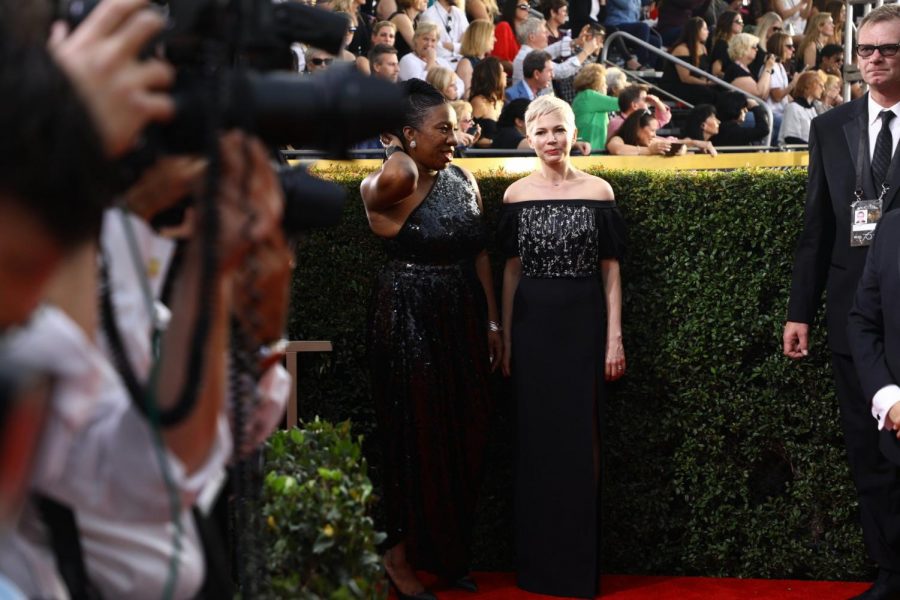Where the Golden Globes stand in a changing culture
photo courtesy of Damon Winter/The New York TImes
Burke, left, and Best Actress in a Motion Picture- Drama nominee Michelle Williams pose on the Golden Globes red carpet.
January 14, 2018
“Their time is up,” Oprah Winfrey said during her acceptance speech for the Cecil B. DeMille award for lifetime achievement at the Golden Globes on Jan. 7. The ceremony that night was full of attendees in black, standing in solidarity with the Times Up Legal Defense Fund, a fund run by the National Women’s Law Center that will subsidize legal support to individuals who have experienced sexual misconduct. The event’s tone was strongly directed at gender equality and ending sexual violence, a topic that became one of the most talked about after a succession of stories about sexual harassment and assault beginning with Harvey Weinstein came to light in late 2017.
Also in late 2017 rose Me Too, a movement that was founded 11 years prior in 2006 by activist Tarana Burke. #MeToo trended as a hashtag on Twitter, but quickly spread to other social media outlets and beyond just the Internet. People, for the first time it seemed, were believing victims and openly denouncing those who commit sexual violence.
With some of Hollywood’s big names no longer supported by much of the public or the rest of the entertainment industry, it was imperative that the issue also be addressed at the upcoming awards shows. And so that’s what lead into the Golden Globes’ 2018 ceremony.
It began with host Seth Meyers’s opening monologue, acknowledging his position as a (straight, white) man, which also made a reference to Weinstein that was jaw-dropping but nevertheless true:
“Well, I think it’s time to address the elephant not in the room. Harvey Weinstein isn’t here tonight. Because, well, I’ve heard rumors that he’s crazy and difficult to work with. But don’t worry, he’ll be back in 20 years when he becomes the first person ever booed during the ‘In Memoriam.'”
Many winners in their speeches motioned to women’s equality, including Nicole Kidman and Laura Dern from “Big Little Lies,” Elizabeth Moss from “The Handmaid’s Tale,” Allison Janney from “I, Tonya” and Greta Gerwig from “Lady Bird,” who was not nominated for Best Director but had the chance to speak when the film won Best Musical or Comedy. Another win was Winfrey’s speech, in which she discussed her journey as a black woman to being where she is today, so moving that the following moment, Natalie Portman emphasizing the “all-male nominees” for Best Director.
There were also- unsurprisingly- more tone-deaf moments, namely the high number of wins “Three Billboards Outside Ebbing, Missouri” won. As compelling as lead actress Frances McDormand’s performance may have been, it’s hard to ignore how the film mishandles issues of racism and sexual assault in the US. James Franco wore a Times Up pin, despite a history of sexual harassment, and so did Justin Timberlake, who appeared in Woody Allen’s latest movie.
Though the rhetoric was about equality and fair treatment, as an event that involves individuals that are already distinguished and wealthy, it takes some time to buy into it. Some of them may have donated to organizations working to end sexual violence, but it’s safe to say that many were only participating symbolically that night, dressed in attire costing thousands of dollars and fully styled. On some levels, it seemed to dismiss Times Up’s fundamental goal: helping the less privileged.
But maybe that symbolic act is what we need, something that shows influential individuals taking a stance, and taking it together. As long as this new culture of publicly rejecting sexual violence continues to grow stronger, it will reach every other industry until, as Oprah said (and is quoted once more), “nobody ever has to say ‘Me Too’ again.”






